Each year the Treasury Board undertakes the Public Service Employee Survey (PSES). In 2019, a total of 182,306 employees in 86 federal departments and agencies responded to the survey. Sixty-two percent of public servants responded.
Harassment remains a serious issue in the federal public service. The results of the 2019 Public Service Employee Survey indicate no significant changes in levels of harassment in the workplace.
Most concerning, levels of harassment of gender diverse people remain very high. Twenty-nine percent of gender diverse people indicate that they had experienced harassment in their workplace. This is more than double the rate of harassment experienced by people identified as women or men.
This is unacceptable. Every person deserves a workplace safe from harassment and the federal government should be setting the standard for the private sector.
Only 51% of respondents to the survey were satisfied with how harassment is resolved in their department. Of gender diverse respondents only 32% were satisfied with how harassment is resolved in their department.
Forty-five percent of individuals identifying as gender diverse would not describe their workplaces as promoting psychological wellness.
We are sounding the alarm - gender diverse public servants deserve stronger protections and safe workplaces.
Each year the Treasury Board undertakes the Public Service Employee Survey (PSES). In 2019, a total of 182,306 employees in 86 federal departments and agencies responded to the survey. Sixty-two percent of public servants responded.
Year to year, we highlight for you the trends in workplace harassment, wellness, and Phoenix.
Workplace harassment
Harassment in the federal public service persists as a significant and largely unaddressed problem. We are extremely concerned with the high levels of harassment reported by gender diverse people. Twenty-nine percent of gender diverse survey respondents indicate that they had experienced harassment in their workplace.
Reports of harassment overall are declining, but very slowly.
|
Year |
Reported workplace harassment |
|
2014 |
19% |
|
2017 |
18% |
|
2018 |
15% |
|
2019 |
14% |
Only 51% of all respondents to the PSES are satisfied with how harassment is resolved in their department.
Psychological wellness
Sixty-one percents of respondents describe their workplace as promoting psychological wellness and actively working to prevent harm to employee psychological health. An increase of 3% from 2018.
This still means that a shocking 39% of public servants do not find that their workplaces are promoting psychological wellness.
Significantly, 45% of individuals identifying as gender diverse do not describe their workplaces as promoting psychological wellness.
Phoenix
The news with respect to the Phoenix Pay System continues to disappoint.
Four percent more public servants reported being impacted by Phoenix last year than in the previous year. That’s 74% of public servants impacted by Phoenix in 2019.
Over half of respondents to the PSES who experienced a Phoenix issue have not had their issues resolved. Only 44% of respondents report that all pay and compensation issues have been resolved. A 9% improvement from 2018.
Sixty percent of respondents are not satisfied with the support they receive related to pay issues.
Compare this year’s results with our analysis from 2018.
According to our 2019 membership survey, career development and training (CDT) is a top priority for seventy percent of PIPSC members – in particular, younger members.
That’s why we’re launching a research project to better understand all aspects of career development and training in the federal public service, such as qualifying for a promotion, attending conferences and staying current with new technology. Learn more about career development and training.
The research project will consist of:
- a membership-wide survey
- telephone interviews
- focus groups
- analysis and recommendations
- ongoing member-led solutions development
What will PIPSC research focus on?
In order to effect sustainable change, it is important that PIPSC fully understands the varying issues associated with career development, professional development, and training.
This research will seek to:
- develop a common understanding of the issues related to career development, professional development and training that PIPSC members are experiencing
- enhance our understanding of how members experience issues differently
- develop evidence-based solutions and policy recommendations for our members
About the CDT Task Force
The CDT Task Force will play a key role in consulting members and will help develop the membership survey and other research tools.
Who: A collective of members with unique insight, keen to improve career development and training
Where: Ongoing virtual communication with the possibility of an in-person meeting
When: Active from February to June 2020, with the possibility of the project extending into the fall
Why: To support and advise on the planning, development and implementation of the project
What to expect as a CDT Task Force member
Task force members will review and revise all project components. They will contribute their time on a rotating basis from February to June 2020, with the possibility of the timeframe extending into the fall.
Most task force work will be conducted through email and videoconferencing. Task force members must be available at least once per month to meet virtually. There is also the possibility of an in-person meeting during the project.
The operation of the CDT Task Force is an iterative process – task force members will lead its development. We are eager to accommodate members who may experience barriers to participation.
If you are interested in joining the CDT Task Force, please complete and submit the following application form by February 18, 2020. Members will be chosen and contacted by March 3, 2020.
OTTAWA, January 27 2020 – The federal government spent over $11.9 billion on management consultants, temporary help contractors and IT consultants between 2011 and 2018 to do the work that could have been done by Canada’s own public service professionals. The contracts ended up costing the public twice their original price.
Shockingly, spending on IT consultants more than doubled – from $605 million in 2011 to over $1.3 billion in 2018 – totalling $8.5 billion in that time period. Seven out of every ten dollars spent on outsourcing is spent on IT consultants.
“These figures are staggering. The government is choosing to pay more for lower quality services for Canadians,” said PIPSC President, Debi Daviau. “The highest quality, most efficient and least expensive expertise already exists within the public service. Instead of relying on the best public service professionals in the world, the government is wasting Canadians’ money on overpriced contractors.”
Over the years, IT consultants have shifted from serving as a temporary replacement or offering specialized skills to delivering a large share of fundamental IT functions. Outsourcing has eroded institutional knowledge, skills and expertise from the public service.
“Enough is enough. It should be easier to hire and train public servants than to pay a shadow public service that ends up costing twice as much originally expected,” said Daviau. “It’s time for the federal government to reduce outsourcing, as promised by the Liberal government in 2015, and to increase requirements for outsourcing.”
The Phoenix pay system best illustrates how fast costs can spiral out of control when an outsourced IT project goes wrong.
“Canadians cannot afford one more failed outsourced IT project like Phoenix. Billions of dollars can be saved if we invest in public servants. Those savings can be spent on projects that will make lives better for Canadians,” added President Daviau.
PIPSC will expand its fight against outsourcing by advocating for changes to staffing in the public service, reviewing the new direction on staffing, expanding the pilots designed to expedite staffing and finding new training opportunities for its members.
“The public services we rely on every single day are at risk of cuts and privatization. Each one of us has a stake in this fight against outsourcing,” said Daviau.
The full report, The real cost of outsourcing, is available here: https://pipsc.ca/news-issues/outsourcing/part-one-real-cost-outsourcing
The Professional Institute of the Public Service of Canada represents 60,000 public service professionals across Canada. Follow us on Facebook and on Twitter.
-30-
For further information: Johanne Fillion, 613-228-6310, ext 4953 or 613-883-4900 (cell), jfillion@pipsc.ca
Government outsourcing, especially outsourcing IT personnel, is costing Canadians billions of dollars each year. From time to time, outsourcing may be necessary to augment staff compliments or bring in external skills and expertise.[1] But years of unchecked spending on outsourcing has created a shadow public service of consultants operating alongside the government workforce. This shadow public service plays by an entirely different set of rules: they are not hired based on merit, representation, fairness or transparency; they are not subject to budget restraints or hiring freezes; and they are not accountable to the Canadian public.[2] It’s time for a major shift in outsourcing policy in the federal public service.
Over the course of 2020, PIPSC will release a series of investigative reports unpacking the government’s growing reliance on outsourcing and its true costs.
Part one: The real cost of outsourcing
Government work, traditionally done by public servants, is increasingly being done by external consultants and contractors at a cost that should shock Canadians. Rather than investing in public servants, government budgets are earmarked for hiring outsourced personnel. Not only are these consultants expensive, the contracts are awarded to corporations that underbid while the actual cost skyrockets. Yet, year over year, the Government continues to make the costly decision to outsource. The majority of IT outsourcing funds are spent by the top ten worst offender departments and agencies in government, raising concerns that departments and agencies are losing the knowledge and skills required to deliver key services. But the problem is pervasive and is growing rapidly across all other government departments and agencies. When you follow where all this money is going – you find a paper trail leading to multinational corporations. Canadians should be aware of how their money is being spent and the true costs of such short-sightedness.
Reliance on personnel outsourcing has more than doubled
Between 2011 and 2018, the federal government outsourced over $11.9 billion in work to IT consultants, management consultants and temporary help contractors. During that same time period, the annual price tag for personnel outsourcing doubled – from just $1 billion in 2011 to nearly $2.2 billion in 2018.
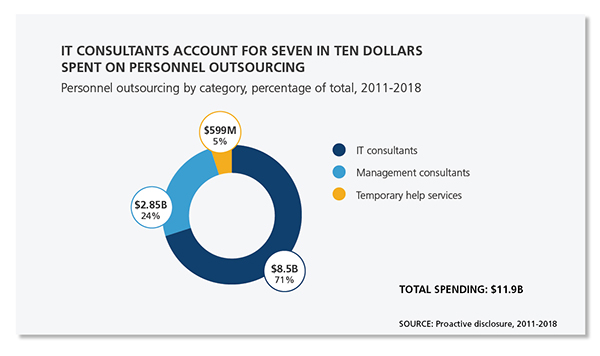
Personnel outsourcing by category, percentage of total, 2011-2018
IT consultants = $8.5 B (71%)
Management consultants = $2.85 B (24%)
Temporary help services $599 M (5%)
Total spending: $11.9 B
Source: Proactive disclosure, 2011-2018
Spending on IT consultants has more than doubled – from $605 million in 2011 to over $1.3 billion in 2018 – totalling more than $8.5 billion.
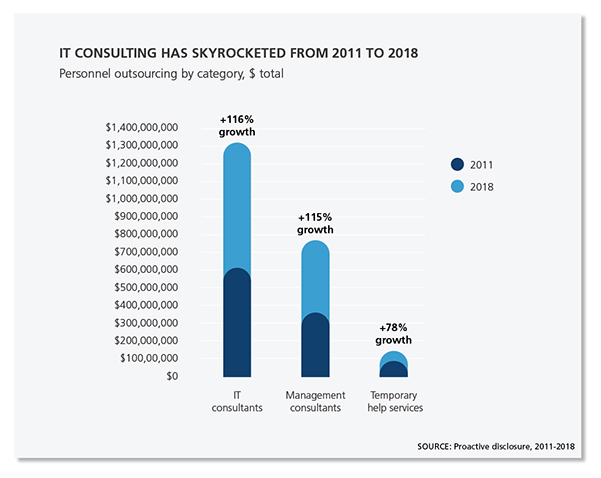
Personnel outsourcing by category, $ total
IT consultants: +116% growth
Management consultants: 115% growth
Temporary help services: 78% growth
Source: Proactive disclosure, 2011-2018
IT consultants are intended to augment staff or to provide specialized skills under certain circumstances. However, a twofold increase in IT outsourcing in just seven years suggests that managers are inappropriately using consultants to deliver a larger share of fundamental IT functions required by the government to deliver services.
Reliance on IT outsourcing is concentrated in 10 departments and agencies
Just 10 of 78 federal government organizations account for nearly 73 percent of the $8.5 billion spent on IT consultants. Five departments and agencies account for nearly half, 49 percent, of the total spent on IT consultants.
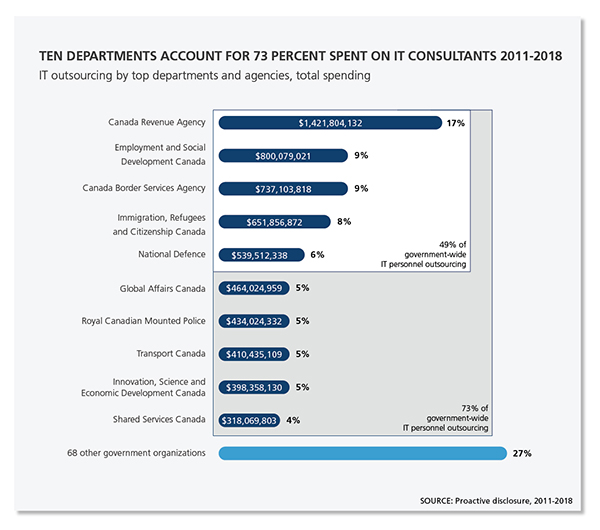
IT outsourcing by top departments and agencies, total spending
Canada Revenue Agency = $ 1,421,804,132 = 17%
Employment and Social Development Canada =$800,079,021 = 9%
Canada Border Services Agency $737,103,818 = 9%
Immigration, Refugees and Citizenship Canada = $651,856,87 = 8%
National Defence = $539,512,338 = 6%
The top five departments account for 49% of government-wide IT personnel outsourcing.
Global Affairs Canada = $464,024,95 = 5%
Royal Canadian Mounted Police = $434,024,332 = 5%
Transport Canada $410,435,109 = 5%
Innovation, Science and Economic Development Canada = $398,358,130 = 5%
Shared Services Canada = $318,069,803 = 4%
The top ten departments account for 73% of government-wide IT personnel outsourcing.
68 other government organizations account for 27%.
Source: Proactive disclosure, 2011-2018
Outsourcing in the top departments and agencies is a serious barrier to developing internal capacity. As more and more IT functions are outsourced to consultants, expertise and knowledge of government IT systems are moved outside of the public service. Since there are no mechanisms to transfer knowledge and expertise back to the departments and agencies after a project is finished, the public service is starved of the ability to provide a growing number of IT functions internally. This reliance on IT consultants is a cause for concern for the public service and the Canadians who rely on public services.
Learn more about the symptoms of IT outsourcing including knowledge loss and the transfer of skills.
Outsourcing has grown rapidly across the government
Despite the concentration of IT outsourcing spending in the top ten departments and agencies, IT outsourcing is growing at an even faster pace in the rest of the government. In 2011, the top ten outsourcing departments accounted for 96 percent of all IT outsourcing in the government. In 2018, the top ten share of all IT outsourcing fell to about 71 percent. In other words, where government outsourcing was once almost completely concentrated in a handful of government departments and agencies, it is now spreading across the entire government.
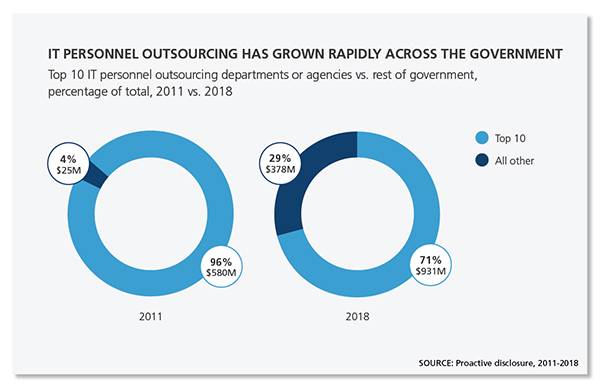
Top 10 IT personnel outsourcing departments or agencies vs. rest of government, percentage of total, 2011 vs. 2018
In 2011, top 10 = $580 M (96%)
All other = $25 M (4%)
In 2018, top 10 = $931 M (71%)
All other = $378 M (29%)
Source: Proactive disclosure, 2011-2018
IT outsourcing increased 5.5 times faster than department payrolls
Government departments showed a clear preference for outsourcing over investing in staff. IT outsourcing budgets more than doubled while payrolls and operating budgets barely kept pace with inflation.[3] IT outsourcing increased 5.5 times faster than payrolls and nearly 10 times faster than the total departmental spending.
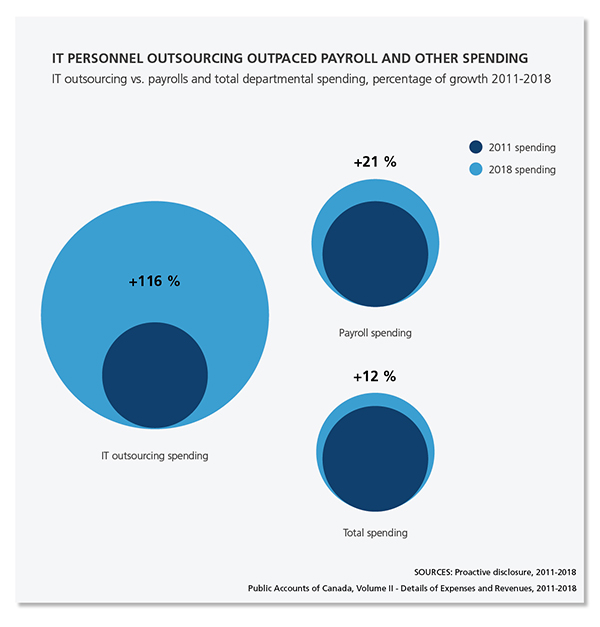
IT outsourcing vs. payrolls and total departmental spending, percentage of growth 2011-2018
IT outsourcing spending
2018 spending vs. 2011 spending = 116% more
Payroll spending
2018 spending vs. 2011 spending = 21% more
Total spending
2018 spending vs. 2011 spending = 12% more
Sources: Proactive disclosure, 2011-2018 and Public Accounts of Canada, Volume II - Details of Expenses and Revenues, 2011-2018
The disproportionate growth in IT outsourcing illustrates a shift in how the government delivers services. Traditionally, the government relied on its internal employees with a small complement of consultants to deliver services. As the need for services increased, the government would hire more internal staff. Now, the departments are increasingly turning to consultants to do a growing share of the ever-expanding work required of the public service. In other words, instead of hiring more internal staff, more-and-more of the relatively constant budgets of departments and agencies are being used to outsource IT consultants.
Sticker shock
IT consultants end up costing the federal government, and in turn Canadians, more than twice as much as expected. On average, the final cost of an IT consultant is more than double the cost of the original contract – far higher than the average mark-up of two-thirds for a management consultant or temporary help contractor.
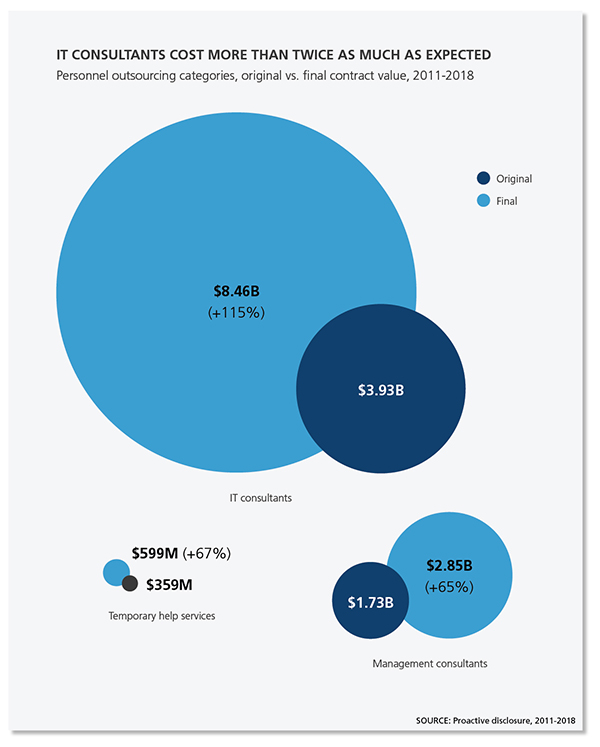
Personnel outsourcing categories, original vs. final contract value, 2011-2018
IT consultants
Original =$3.93 B
Final = $8.46 B (+115%)
Temporary services
Original =$359 M
Final = $599 M (+67%)
Management consultants
Original = $1.73 B
Final = $2.85 B (+65%)
Source: Proactive disclosure, 2011-2018
The reason these contracts cost significantly more than their initial value is twofold:
- Government managers have significant flexibility to modify contracts after they have been signed. The value of contracts can be increased by as much as 50 percent without having to be re-tendered.[4]
- The discretion to modify contracts pushes contractors to become ‘loss-leaders.’ Corporations win contracts with low bids that do not cover the cost to deliver a service – also known as “suicide bidding.” The loss-leader can then squeeze out profits through revisions once the contract is signed.
It is no surprise that contractors under-estimate costs and that as a project develops the scope and budget swells. However, year over year the decision-makers seem to ignore these ballooning costs and allow budgets to overrun.
Better digital capacity and services for Canadians
There is a real-world cost to outsourcing – look at the human cost of Phoenix. A project doomed from the start that is costing taxpayers billions of dollars. The government continues to throw good money after bad while the livelihoods of public servants are at stake. Prime Minister Trudeau, in his 2019 ministerial mandate letters, directed cabinet to “raise the bar on openness, effectiveness and transparency in government” and build “better digital capacity and services for Canadians.”[5] To succeed in this, the government needs to invest in a highly trained, cutting-edge public service to deliver the next generation of digital services rather than further entrench itself in an unhealthy reliance on IT consultants.
Stay tuned as we release our series of reports outlining the real costs and symptoms of government outsourcing. Our second report will focus on how outsourcing is not only made convenient for management but erodes government staffing values including transparency, accountability, merit and representation (gender, region, ethnicity and bilingualism) by bypassing the staffing system.
[1] According to the Treasury Board’s Outsourcing Policy (16.1.5) Managers can outsource for personnel if they need to fill in for a public servant during a temporary absence, to meet an unexpected fluctuation in workload, or to acquire special expertise not available within the public service. However, in the case of outsourcing IT work, managers, working with PIPSC CS members, must first make every reasonable effort to use existing employees or hire new indeterminate employees before outsourcing (Article 30.1 of the PIPSC CS Group collective agreement).
[2] David, McDonald. The Shadow Public Service. The Canadian Centre for Policy Alternatives. 2011.
[3] According to Statistics Canada, CPI inflation between 2011 and 2018 was 11.3%. Table: 18-10-0005-01 (formerly CANSIM 326-0021).
[4] David McDonald, The Shadow Public Service The Canadian Centre for Policy Alternatives. P.12. 2011.
[5] Office of the Prime Minister. Minister of Digital Government Mandate Letter. December 2019. Retrieved from: https://pm.gc.ca/en/mandate-letters/minister-digital-government-mandate-letter
The implementation of new collective agreements is underway for the AV, NR, RE, SH, SP, AFS (CRA), NRC (IS, LS, RO-RCO, TR), NEB, NFB, NUREG (CNSC) and OSFI groups.
This webinar video outlines the details of your pay increase and the tips for calculating retro pay. You will also find useful information about implementation timelines and the penalties for the employer if these timelines are not met.
The webinar presentation is available in English and French.
We expect a large number of members have already received their pay increases. After that process is complete, your employer can start calculating and distributing retro pay over the coming weeks and months.
Information on the timelines specific to your group are available in our FAQs.
Welcome 2020!
We are heading into the new year, energized and determined.
In the year ahead, we will work hard to get back every cent owed from Phoenix, ratify the new Employee Wellness Support Plan, fight outsourcing and protect our pensions.
What the Federal Government’s Ministerial Mandate Letters Mean for Our Members
Productive meeting with Federal Pay Equity Commissioner Karen Jensen
2019: A year of results
2019 saw new collective agreements for 14 groups, new scientific integrity policies, Phoenix compensation and progress on the new pay system. Together, we made this all happen.

